
Custom Drupal Development. Examples and How to Choose the Best Services
Drupal is a content management system known for its flexibility and ability to adapt to unique project requirements. With its modular architecture and extensive ecosystem, Drupal enables tailor-made solutions - from unique functionalities to customizing existing modules to meet specific business needs. In this article, we’ll explore custom Drupal services, their role in creating bespoke solutions and provide tips on how to choose them to support your organization’s goals.
What are custom Drupal development services?
Custom Drupal development involves tailoring Drupal’s robust framework to meet the specific needs of a business or organization. Building systems on Drupal is akin to assembling a project from modular building blocks, including:
- Drupal Core – the foundational framework of the platform.
- Contributed modules – add-ons developed by Drupal Community that extend the CMS functionality.
- Custom modules – features developed specifically to meet unique client requirements.
- Themes – bespoke designs that determine the look and feel of the Drupal site, tailored to the client's branding.
By combining and configuring these elements, we create flexible, cost-effective content management solutions that align perfectly with business goals. Depending on the type of project, we can meet 50-99% of business requirements using contributed modules, significantly reducing web development costs. For projects built on Droopler, our Drupal distribution for building websites, this figure often reaches close to 100%, enabling rapid deployment with minimal custom development.
Drupal as a tool for personalization
Drupal’s open source nature and extensive ecosystem make it an ideal platform for building customized content management systems. Its modular structure allows developers to blend Drupal Core, contributed modules, and custom features seamlessly, creating unique digital experiences. Furthermore, its robust API integrations and advanced configuration capabilities empower organizations to deliver tailored user experiences while maintaining scalability and reliability.
Development of custom modules and features
One of the key aspects of custom Drupal development is the ability to create custom modules tailored to a business’s specific needs. These add-ons fill functional gaps that contributed modules may not cover, providing innovative and highly specific functionalities. By focusing on modularity, at Droptica, we ensure that these features integrate seamlessly with existing components and maintain the overall system's stability, guaranteeing smooth upgrades and consistent performance.
Adapting existing solutions to specific requirements
Custom Drupal development includes fine-tuning and configuring contributed modules to match unique project requirements. By leveraging the vast ecosystem of contributed modules available on Drupal.org, Droptica ensures that most client needs are met with pre-existing solutions, optimizing costs and development time. Where necessary, these modules are enhanced or extended to align with specific workflows, resulting in efficient and cost-effective outcomes.
By leveraging this structured and modular approach to custom Drupal development, businesses can achieve tailored solutions that fulfill their current requirements while offering the flexibility to adapt to future challenges and opportunities.
Custom development - areas of usage
Custom Drupal services have been successfully applied across various industries, enabling businesses to meet unique challenges and deliver exceptional user experiences. Here are some key examples of how these services can be utilized.
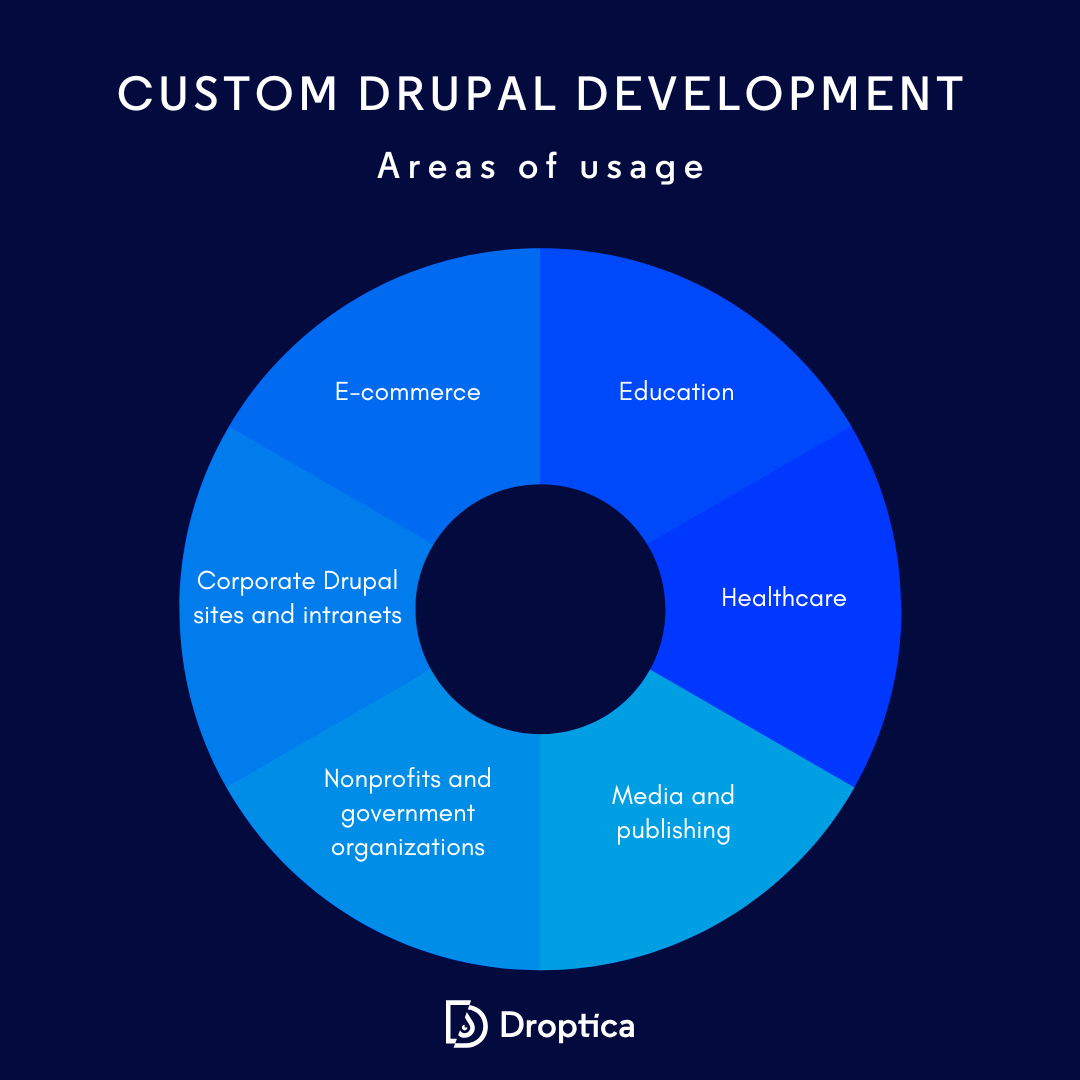
E-commerce
In the competitive world of online retail, custom Drupal solutions enable businesses to create feature-rich e-commerce platforms. These include personalized shopping experiences, advanced inventory management, seamless integration with payment gateways, and robust analytics to track customer behavior. By leveraging both contributed and custom modules, retailers can build scalable platforms that adapt to market trends and customer needs.
Education
Educational institutions (e.g. related to higher education) benefit from Drupal’s flexibility to build platforms catering to students and administrators. Examples include creating custom learning management systems (LMS), integrating student portals, and developing features for online course management. Custom services can also deliver personalized dashboards, role-based access for teachers and students, and seamless integration with third-party systems such as video conferencing tools or digital libraries.
Healthcare
The healthcare sector demands platforms that aren’t only highly functional but also compliant with strict regulations, such as HIPAA in the U.S. Custom Drupal development enables healthcare providers to create patient portals, appointment booking systems, and secure data-sharing tools. Additionally, Drupal’s ability to integrate with external systems, like electronic health records (EHR) and telemedicine platforms, makes it a powerful choice for building healthcare solutions.
Media and publishing
For media and publishing companies, Drupal offers the ability to manage large volumes of content efficiently while ensuring excellent performance. Custom services can be used to create tailored workflows for editors, implement advanced search and filtering features, and integrate ad management systems. Additionally, personalized content recommendations powered by custom modules can drive user engagement and increase page views.
Nonprofits and government organizations
Nonprofits and government agencies often rely on Drupal to deliver accessible, multilingual, and mission-driven platforms. Custom services allow for creating donation portals, event management tools, and dynamic content systems. Drupal’s strong security features combined with customizations ensure that these organizations can meet their objectives while maintaining data protection and usability.
Corporate Drupal sites and intranets
Custom Drupal solutions help corporations build dynamic websites and intranet systems that support internal and external communication. Features such as advanced user role management, custom dashboards, and CRM or ERP systems integrations enable businesses to streamline workflows and improve efficiency. Personalization tools can further enhance employee engagement and user satisfaction.
Overview of Custom Drupal Services
Custom Drupal services encompass a wide range of solutions designed to tailor the Drupal platform to meet the specific needs of businesses and organizations. By combining Drupal Core, contributed modules from Drupal.org, custom-built modules, and bespoke themes, these services ensure that the platform is highly functional, scalable, and aligned with unique project requirements.
Custom Drupal module development
A key aspect of custom Drupal services is custom module development, which enables the creation of tailored solutions to extend functionality beyond what Drupal Core or contributed modules offer. For example, a dedicated module might manage advanced reporting features, custom workflows, or integrations with proprietary systems. These modules are developed to seamlessly integrate with the existing architecture, ensuring performance and maintainability.
Integrations with external systems
Custom Drupal development also involves integrating Drupal with third-party systems, such as CRMs (e.g., Salesforce), ERPs, payment gateways, marketing platforms, or analytics tools. These integrations enhance functionality, automate data flow, and improve the overall efficiency of business processes. For instance, integrating Drupal with a CRM allows seamless management of customer interactions, while ERP connections facilitate streamlined inventory or supply chain management.
Optimization and personalization of the user interface
Creating themes is another essential aspect of Drupal development. It involves designing a unique, brand-aligned appearance and optimizing the user interface (UI) for accessibility, performance, and engagement. Personalization features, such as tailored content delivery based on user roles or preferences, can also be implemented to enhance the end-user experience.
Automating processes and workflows
Automation is a significant focus of custom Drupal development, enabling organizations to save time and resources by automating repetitive tasks. This could include content approval workflows, notifications, and integrations with automation platforms like Zapier. Such solutions streamline operations, reduce errors, and boost efficiency.
Advanced access management
Drupal’s robust user role and permission system can be further customized to meet the unique needs of organizations requiring advanced access management. Custom services can be used to create complex user hierarchies, granular access controls, and dynamic roles that adapt to organizational changes, ensuring security and operational efficiency.
By leveraging these custom services, businesses can build platforms that go beyond standard implementations, delivering functionality and design tailored to their specific goals. This modular and flexible approach ensures that the system not only meets current needs but is also ready to scale and evolve as the business grows.
How to choose the right custom Drupal development services
Selecting the right custom Drupal services is essential to ensure your platform meets your business needs effectively while staying within budget and timeline constraints. Here’s a step-by-step guide to help you make informed decisions.
1. Analyze project requirements
Start by thoroughly assessing goals and needs of your Drupal project. Define the key functionalities, new features, and integrations crucial for your platform. For example, consider whether your project requires creating modules, advanced user management, or third-party system integrations. A clear understanding of your business objectives and technical requirements will help identify the scope of customizations needed.
2. Prioritize scalability and flexibility
Choose services that not only meet your current needs but also allow for future growth and changes. Custom Drupal solutions should be built with scalability in mind, ensuring that your platform can handle increased traffic, additional advanced features, or expansions into new markets as your business grows.
3. Partner with experienced professionals
Collaborating with a skilled and experienced Drupal development company is crucial to the success of your project. Look for a service provider, like Droptica, with a proven track record in custom Drupal development, a deep understanding of contributed modules, and the ability to create bespoke solutions. Experienced Drupal developers can guide you through the decision-making process, ensuring your platform is efficient and aligned with secure coding practices.
4. Evaluate budget and timeline
Determine your budget and set realistic timelines for your Drupal project. Custom solutions often involve a mix of contributed modules and bespoke development, and understanding the cost implications of each element is key. Collaborating with a transparent service provider ensures you can balance customization needs with available resources, avoiding unnecessary expenses.
5. Focus on long-term maintenance and support
Custom solutions require ongoing maintenance to ensure they remain functional, secure, and up to date. Choose a service provider that offers comprehensive Drupal support, including module updates, performance optimization, and troubleshooting. A strong partnership with a reliable team ensures your platform remains adaptable and resilient over time.
6. Check case studies and references
Review case studies or examples of past projects to see how the service provider has handled similar requirements. This will give you insights into their expertise, problem-solving approach, and the quality of their work. References from previous clients can also provide valuable feedback on their reliability and communication.
By carefully analyzing your needs, collaborating with experienced experts, and planning for scalability and support, you can select custom services that drive your project’s success while ensuring long-term value and efficiency.
Benefits of custom Drupal solutions
Custom Drupal solutions offer many benefits that empower businesses to build flexible, efficient, and scalable platforms tailored to their unique requirements. Organizations can gain significant competitive advantages while optimizing operational processes by going beyond standard implementations.
Scalability and flexibility
Custom Drupal solutions are designed to grow alongside your business. Whether you're expanding to new markets, increasing traffic, or introducing additional features, Drupal’s modular architecture and custom-built components ensure seamless scalability. This flexibility allows businesses to adapt their platform to evolving market demands and user expectations without extensive overhauls.
Competitive advantage
In highly competitive industries, standing out is crucial. Custom solutions allow businesses to create unique functionalities and personalized user experiences that differentiate them from competitors. For example, custom modules can enable advanced search features, personalized content delivery, or integrations with proprietary tools, providing a distinct edge in the marketplace.
Operational efficiency
Custom Drupal development streamlines business processes by automating repetitive tasks, optimizing workflows, and integrating systems for better data management. For example, connecting Drupal with CRM or ERP systems ensures smooth information flow between departments, reducing errors and saving time. Tailored workflows and dashboards also improve productivity, allowing teams to focus on strategic initiatives.
Enhanced user experience
A personalized and intuitive user experience (UX) is key to engaging your audience and achieving your goals. Custom themes and features ensure your platform aligns with your branding and user preferences. Additionally, features like dynamic content delivery, advanced role-based access, and optimized navigation contribute to higher user satisfaction and retention.
Cost efficiency
While custom solutions may involve an initial investment, they often result in long-term cost savings. By leveraging Drupal’s contributed modules wherever possible, businesses can reduce development time and costs, reserving custom work for unique needs. This approach ensures a cost-effective balance between off-the-shelf and bespoke solutions.
Improved security and compliance
For industries that handle sensitive data, such as healthcare or finance, security is paramount. Custom Drupal solutions allow for implementing advanced security measures, such as custom access controls, encrypted communications, and compliance with regulations like GDPR or HIPAA. This ensures that your platform meets stringent security standards and builds user trust.
Future-proofing
The active Drupal Community and continuous updates make it a sustainable choice for long-term projects. Custom solutions are built with adaptability in mind, allowing for seamless upgrades as Drupal evolves. This future-proofing minimizes technical debt and ensures your platform remains relevant and functional for years.
By investing in custom Drupal solutions, businesses can achieve a platform that not only meets their current needs but also positions them for future growth and success. These benefits make custom development an invaluable tool for organizations looking to maximize their impact and efficiency in today’s digital landscape.
Example of project utilizing custom Drupal services
Better Regulation is a comprehensive platform tailored for cataloging and searching formal and legal documents, while also providing timely notifications about any updates to these documents. Designed for use by major organizations and businesses across the UK and Ireland, the system streamlines the management of thousands of documents. It empowers users with advanced tools to search, monitor, and instantly notify stakeholders about changes in documents or areas they track.
The client’s vision required features that far exceeded the standard capabilities of Drupal’s core and existing modules. By pushing the boundaries of Drupal’s potential, we developed a highly customized solution to meet their exact needs. To achieve this goal, we created quite a few custom modules.
Module for saving user-clicked search criteria
After saving, the user can set to receive email notifications when there is a new result for the saved filters. The module’s description sounds simple, but the solution uses a lot of components like custom entities, views, facets, and Apache Solr queries. The module has to operate optimally while analyzing a lot of data.
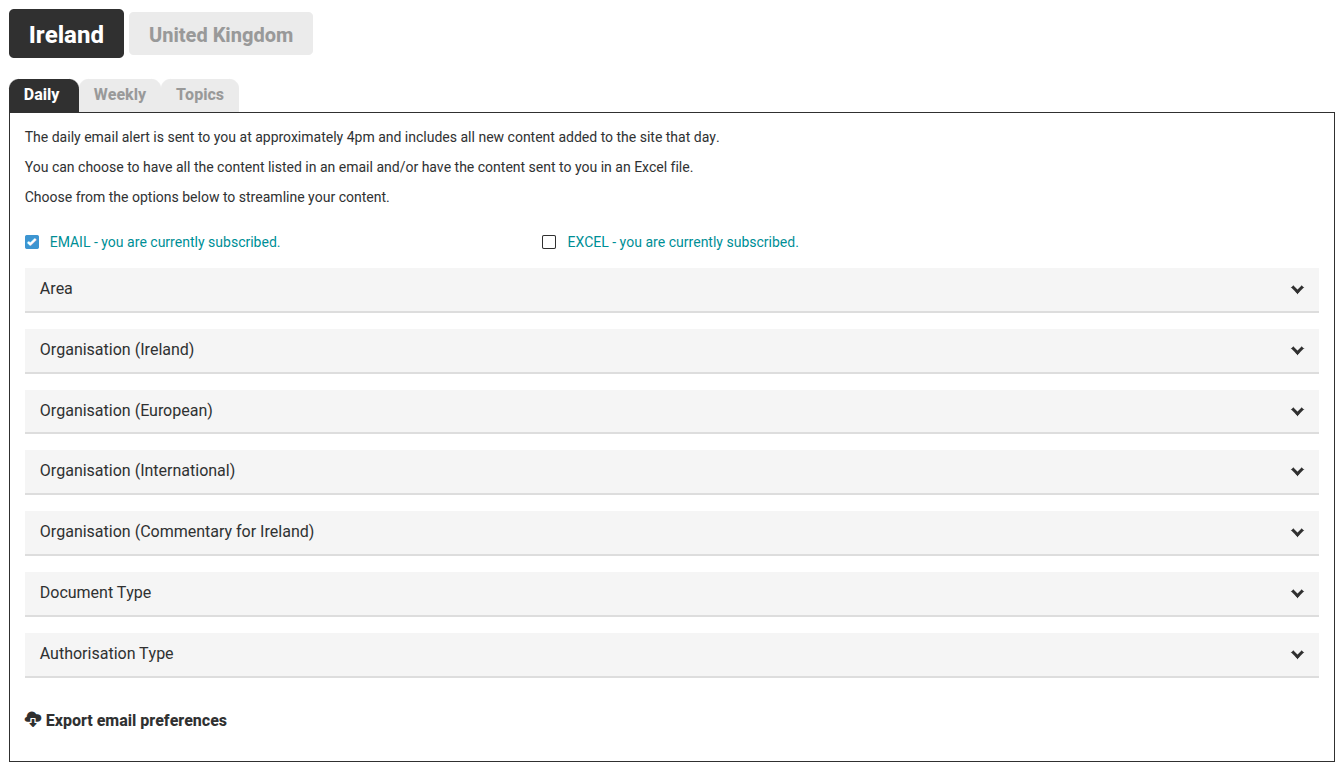
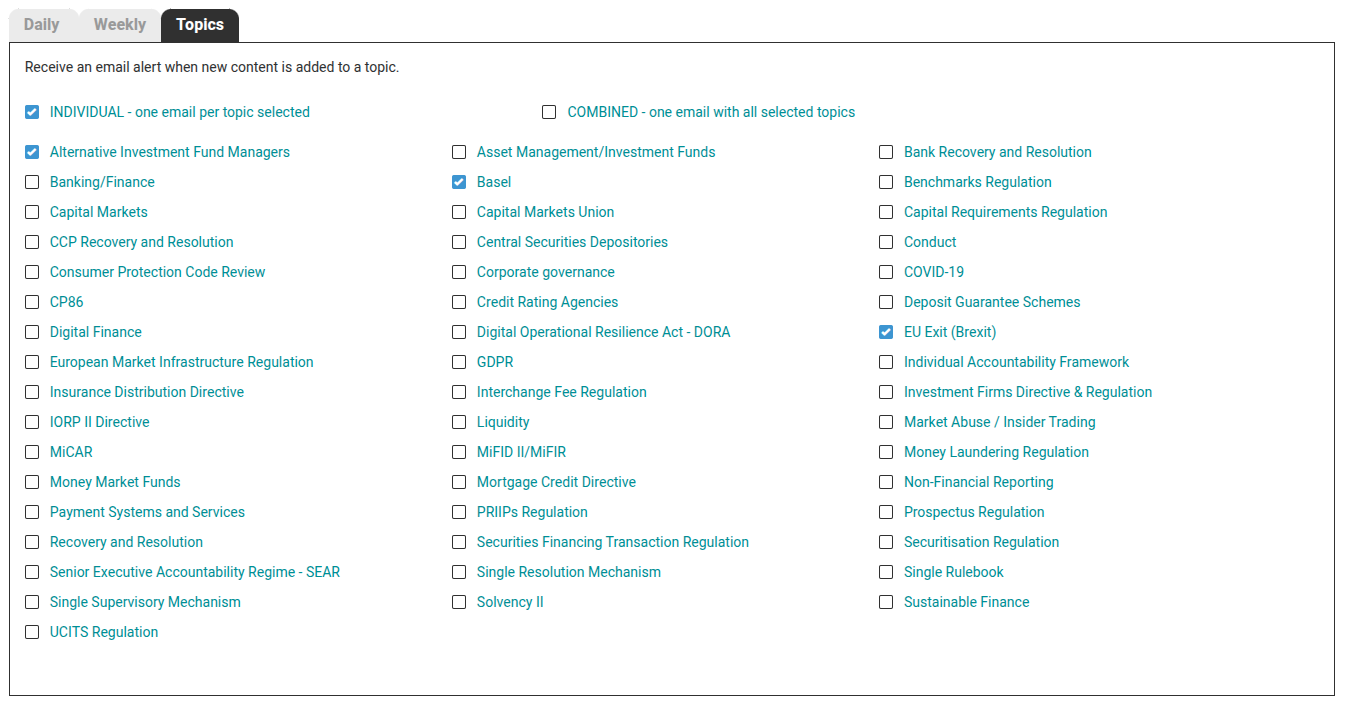
Module for generating documents based on user-clicked options
Ultimately, the user can generate documents in PDF, Word, HTML, and Google Docs or Sheets formats. If the document is large, it goes into a queue and is emailed when generated.
The user can save clickable options to select from a list the next time they are loaded (custom entity).
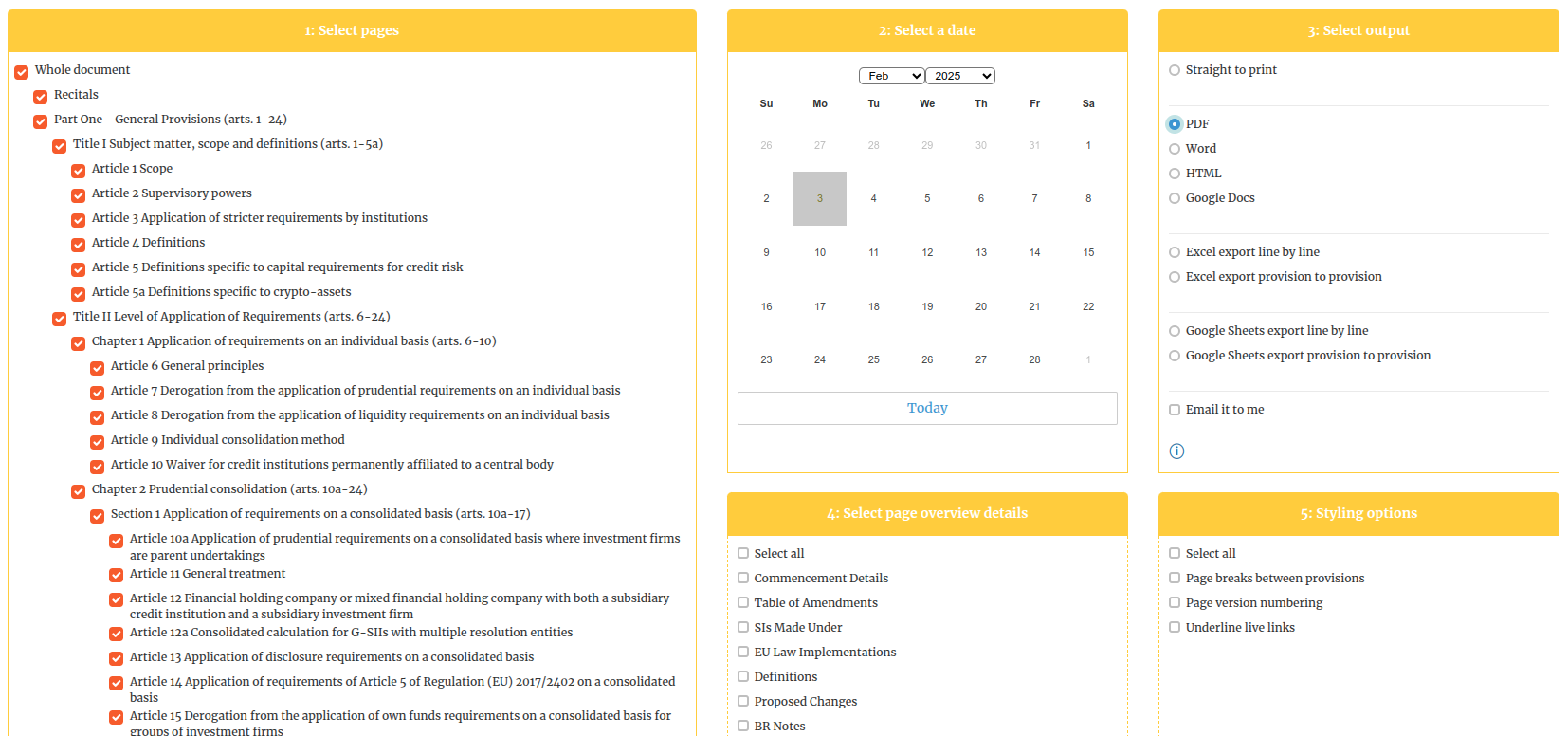
Module for content comparison
The Diff tool in Drupal (used to compare versions of legal acts) turned out to be insufficient in terms of optimization. That’s why we integrated the Better Regulation platform with the Draftable tool.
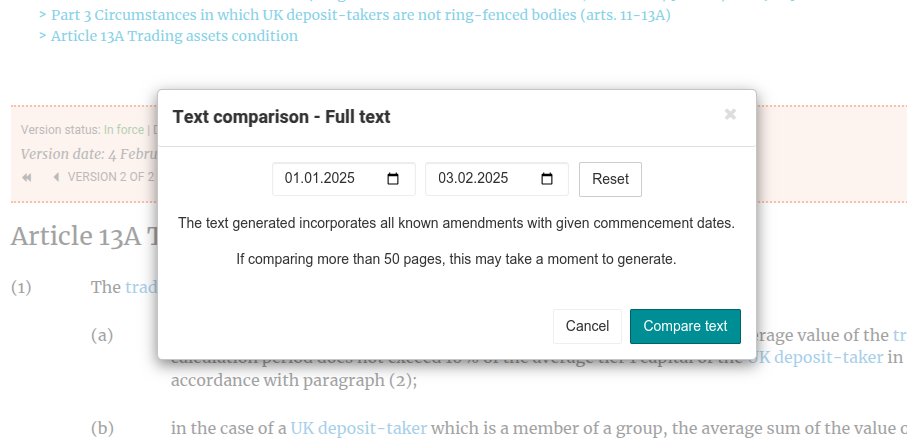
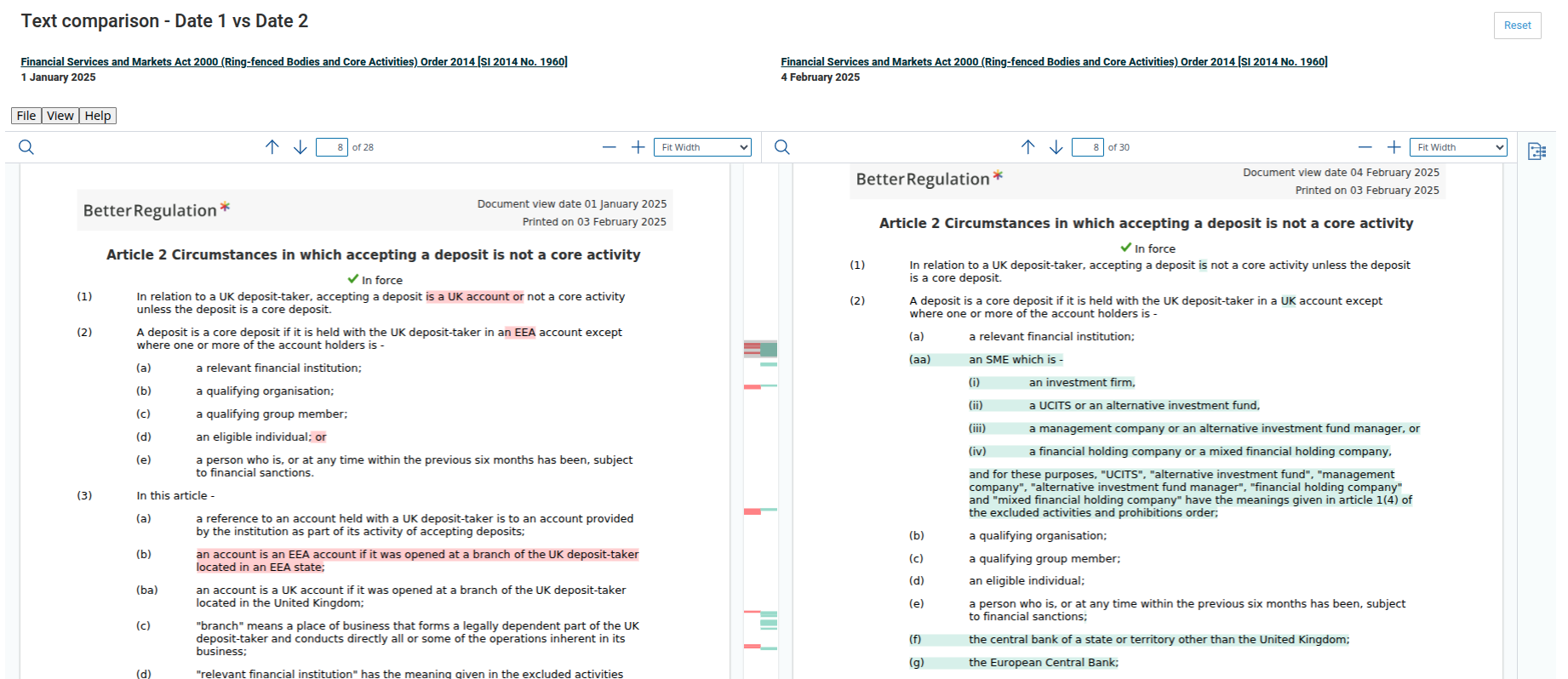
Module for setting document view date
The Date-Stamp tool allows the user to view legislation or other regulatory documents as they existed at a specific point in time, using past or future dates. Once a document is ‘Date-Stamped,’ the user gains access to its consolidated version as it appeared on the selected date. In this mode, users can seamlessly explore the document while maintaining the chosen timeframe. However, if they navigate away from the document, the date selection resets.
Module for creating a report template
To support the internal reporting workflow, users can create unique prepopulated report templates for any document they view. The report presents all high-level information in an editable Word document, allowing for seamless internal data input and summary preparation.
Risks associated with custom Drupal development
While custom Drupal development offers numerous advantages, it also comes with potential risks that businesses should be aware of. Choosing the wrong Drupal development company or an inexperienced specialist can lead to costly inefficiencies, technical debt, and solutions that don’t fully align with business requirements. Below are some of the most common risks and how they can impact a Drupal project.
Lack of knowledge about existing contributed modules
Drupal has a vast ecosystem of contributed modules - numbering in the thousands - designed to provide solutions for various functionalities. However, a developer or agency unfamiliar with these modules may fail to utilize existing solutions effectively. This can lead to:
- Unnecessary custom development – Instead of leveraging an already tested and community-supported contributed module, Drupal developers may build a custom solution from scratch, increasing costs and development time.
- Missed opportunities for efficiency – If a developer is unaware of a module that perfectly fits a business need, they may resort to workarounds that introduce inefficiencies or additional complexities.
- Lack of security and maintenance – Contributed modules are maintained by the Drupal community and frequently updated. An inexperienced developer might neglect to use these updates, leading to potential security vulnerabilities and long-term maintainability issues.
Inability to develop custom modules when necessary
On the other end of the spectrum, specialists who lack experience in custom module development may struggle when a contributed module doesn’t fully meet business needs. This can result in:
- Over-reliance on contributed modules – Some business requirements are too specific to be met by existing modules. Drupal developers who can’t create custom modules might force the use of multiple contributed modules in ways they weren’t designed for, leading to performance issues, bloated configurations, and increased maintenance complexity.
- Inflexible solutions – Businesses may be limited by the constraints of contributed modules rather than having a system that truly serves their unique needs. This can result in poor UX, inefficient workflows, or an inability to integrate key third-party services.
- Difficulties in scaling – A lack of properly written custom modules may create limitations in scaling the system as the business grows, leading to expensive rework in the future.
The importance of a balanced approach
The key to successful custom Drupal development lies in striking the right balance between using contributed modules and developing custom solutions. A skilled Drupal agency, like Droptica, ensures that each business requirement is evaluated carefully:
- If a reliable, well-maintained contributed module exists and meets the need, we use it to minimize cost and speed up development.
- If no suitable contributed module is available or modifications are too extensive, we develop a custom module to provide a precise, efficient solution.
By working with a team that understands both how to select the right contributed modules and how to write efficient custom ones, businesses can avoid common pitfalls, optimize development costs, and ensure their Drupal platform is scalable, maintainable, and aligned with their goals.
Custom Drupal development - summary
Custom Drupal solutions are a powerful tool for businesses looking to create platforms that are tailored to their unique needs, scalable for future growth, and optimized for efficiency. By leveraging Drupal’s modular architecture - combining Drupal Core, contributed modules, custom-built functionalities, and bespoke designs - organizations can achieve a perfect balance of flexibility, functionality, and cost-effectiveness.
Partnering with an experienced Drupal agency, like Droptica, ensures access to a skilled team that can guide you through the process of building a robust and future-proof platform. With our expertise in configuring contributed modules, developing custom solutions, and creating tailored designs, you can trust us to deliver a system that aligns with your vision and supports your long-term business objectives.
By investing in custom Drupal development, you gain a competitive edge, enhance operational efficiency, and provide exceptional user experiences that set your business apart. Whether you’re looking to launch a new platform, upgrade an existing one, or integrate advanced features, custom services can transform your ideas into a reality.
If you’re ready to explore the possibilities of custom Drupal development services, we’re is here to help. Together, we can create a platform that drives your business forward.











